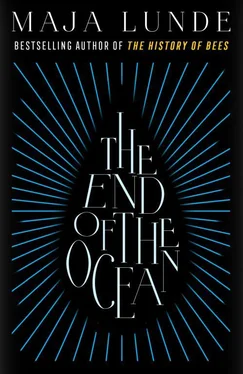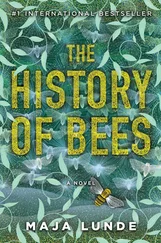“Yes.”
“So the boat doesn’t sail away.”
“And then, one morning we find the cradle floating on the surface of the water. Gravity no longer holds the boat in place.”
“Gravity?”
“The force that keeps us on the ground. That makes things fall down. Not up. And when that happens, when the boat is floating, then it’s ready for us.”
“Then we get on board.”
“We pack our things and get on board.”
“All three of us.”
“And I start the engine.”
“No, I start the engine.”
“You start the engine.”
“Then we sail away.”
“The boat glides slowly through the canals. We pass through the sluices. Towards Bordeaux. Towards the coast.”
“And I get to steer.”
“You get to steer.”
“We’re not in a hurry. We watch the landscape around us. How it changes. How everything has turned green. The water has infused all the grayness with color. The ground is no longer dusty, but safe, solid. The trees are no longer black, they are sprouting leaves. And then we notice something new in the air. You’re sitting on deck when I first become sure. I walk over to you and Marguerite takes the tiller. I sit down with you. Pull you towards me.”
I put my arm around her, felt her body against mine, fragile, but still alive, heard her breathing, a child’s eager and slightly irregular breathing.
“Keep going,” she whispered.
“Then you notice it too,” I said. “That something is about to happen. At first we think we’re just imagining it. But the longer we sit there, the more certain we become. And you look up at me, sort of to ask me if I am feeling the same thing as you are. And I nod.”
“Yes?”
“There’s something different in the air. The dry, dusty air that always makes your throat scratchy clears up. It’s easy to breathe. We move into something else. We’re on our way. We will get there. Everything is fresh. Everything is clear. Everything is new. But all the same, familiar. Because we recognize this smell. This air, this dampness, the openness. It’s what we came from. That’s how the air was at home.”
“Home.”
“Do you feel it? I will ask you. Can you smell the air? Do you smell the scent of salt?”
Abig thank-you to the people who contributed their expertise to the novel: hydrologist Lena Merete Tallaksen, former construction manager and spreader base Ole Bjørn Helberg, Communications leader Anne Gravdahl and professional consultant Dag Endre Opedal at the Norwegian Vasskraftog Industristad museum, production manager at Istad Kraft AS Geir Blakstad, Carl Erick Fuglesang in Profinor, Geir Blakstad, zoologist Petter Bøckman, technical advisor Christian Børs Lind and former General Secretary Per Flatberg of Friends of the Earth Norway, firefighter Jørund Lothe Salvesen, general manager Jonas Ådnøy Holmqvist in Fivas, senior advisor Ellen Hofsvang in the Rainforest Foundation, and author Erik Martiniussen. Thanks also to my wise editors Nora Campbell and Hilde Rød-Larsen, as well as the entire staff at Aschehoug and Oslo Literary Agency who work with professionalism and enthusiasm for my books every single day.
Special thanks to the organization A Drop in the Ocean, which made it possible to visit the refugee camp Skaramangás in Athens; to volunteer Anne-Lene Bjørklund for her invaluable help, and to all who showed me around and welcomed me with open arms: Nanci Vogel Clifton, Hesham Jreeda, Fahimzia Ahmadi, Halitim Mohamed Rafik, Sam Aloso, and Sayed Hashimi. And especially thanks to Jack, who invited me to his 12th birthday.
Last, and most importantly, a big thank-you to Kari Ronge, Stein Lunde, and Gunn Østgård, who have shared their lives and their knowledge, both on land and at sea, and to Steinar Storløkken, Jesper, Jens, and Linus for being my life.
‘The History of Bees’ Excerpt
Loved The End of the Ocean?
Read on for an extract from Maja Lunde’s international bestseller


Chapter 1
TAO
District 242, Shirong, Sichuan, 2098
Like oversize birds, we balanced on our respective branches, each of us with a plastic container in one hand and a feather brush in the other.
I climbed upwards, very slowly, as carefully as I could. I was not cut out for this, wasn’t like many of the other women on the crew, my movements were often too heavy-handed. I lacked the subtle motor skills and precision required. This wasn’t what I was made for, but all the same I had to be here, every single day, twelve hours a day.
The trees were as old as a lifetime. The branches were as fragile as thin glass, they cracked beneath our weight. I twisted myself carefully, mustn’t damage the tree. I placed my right foot on a branch even further up, and carefully pulled the left up behind it. And finally I found a secure working position, uncomfortable but stable. From here I could reach the uppermost flowers.
The little plastic container was full of the gossamer gold, carefully weighed out. I tried to transfer invisible portions lightly out of the container and over into the trees. Each individual blossom was to be dusted with the tiny brush of hen feathers, from hens scientifically cultivated for precisely this purpose. No feathers of artificial fibers had proven nearly as effective. It had been tested, and then tested again, because we had had plenty of time—in my district the tradition of hand pollination was more than a hundred years old. The bees here had disappeared back in the 1980s, long before The Collapse; pesticides had done away with them. A few years later, when the pesticides were no longer in use, the bees returned, but by then hand pollination had already been implemented. The results were better, even though an incredible number of people, an incredible number of hands were required. And so, when The Collapse came, my district had a competitive edge. It had paid off to be the ones who polluted the most. We were a pioneer nation in pollution and so we became a pioneer nation in pollination. A paradox had saved us.
I stretched as far as I could, but couldn’t quite reach the blossom at the very top. I was about to give up, but knew I might be punished, so I tried once more. Our pay was docked if we used up the pollen too quickly. And our pay was docked if we used too little. The work was invisible. When at the end of the day we climbed down from the trees, there was no evidence of our work except for the red chalk X ’s on the tree trunks, ideally up to forty trees each day. It wasn’t until autumn came and the trees were laden with fruit that we would know who among us had actually succeeded in their work. And by then we had usually forgotten which trees had been dusted by whom.
I was assigned to Field 748 today. Out of how many? I didn’t know. My group was one of hundreds. In our beige work uniforms we were just as anonymous as the trees. And just as close together as the flowers. Never alone, always together in a flock, up here in the trees, or wandering down the tire ruts from one field to the next. Only behind the walls of our own small flats could we be alone, a few short hours a day. Our whole lives were out here.
It was quiet. We weren’t allowed to speak while we worked. The only sound to be heard was that of our careful movements in the trees, a faint clearing of the throat, some yawns and the material of our uniforms against the tree trunks. And sometimes the sound we had all learned to dislike—a branch creaking and in the worst case breaking. A broken branch meant less fruit, and yet another reason to dock our pay.
Читать дальше












